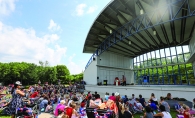Log rolling, or the favorite sport of the American lumberjack, is quickly becoming a favorite among locals. The unique activity is exactly what it sounds like—rolling (or running on) logs, until someone falls into the water. The folks at French Regional Park are offering an exciting log rolling class this month, allowing families to get some exercise while having a blast.
“We teach the basics of it: balance, feet placement, where you’re supposed to be looking while on the log,” says Alex McKinney, recreation supervisor at Three Rivers Park District, who helped introduce the class to summer instructors a few years ago.
“We really started to think, ‘What are some things that aren’t being done?’ We heard about log rolling and thought that would be cool to do in the Twin Cities,” McKinney says.
The sport has its origins in the great logging era of the late 1800s, when lumberjacks would step on jammed logs floating down the Mississippi River. Since then, it’s morphed into a recreational activity and become considerably more accessible, thanks to Keylog Rolling—a company located in Golden Valley—which invented a lightweight, easily transportable hollow log, made of high-density polyethylene, the same material as canoes and kayaks.
Physical benefits, which include balance, agility, concentration and core strength, also play a part in the sport’s growing popularity. “It’s very aerobic, almost like running,” McKinney says.
For beginners worried about falling, logs come with “trainers”—resistance devices strapped to the ends of the logs. Past participants, though, often shed the training wheels with a few tips from instructors: “You want to keep your feet moving to a fast rhythm, and looking down at the end of the log. Try to keep your weight centered, not too far forward or backwards,” McKinney says.
Logs are 10 feet long, and each class has at least two instructors floating between students in a 3-feet-deep swimming area of Medicine Lake, making falling into the shallow water the only real concern.
“You’ll want to bring dry clothes,” McKinney says. “You will get wet.” keylogrolling.com; threeriversparks.org









